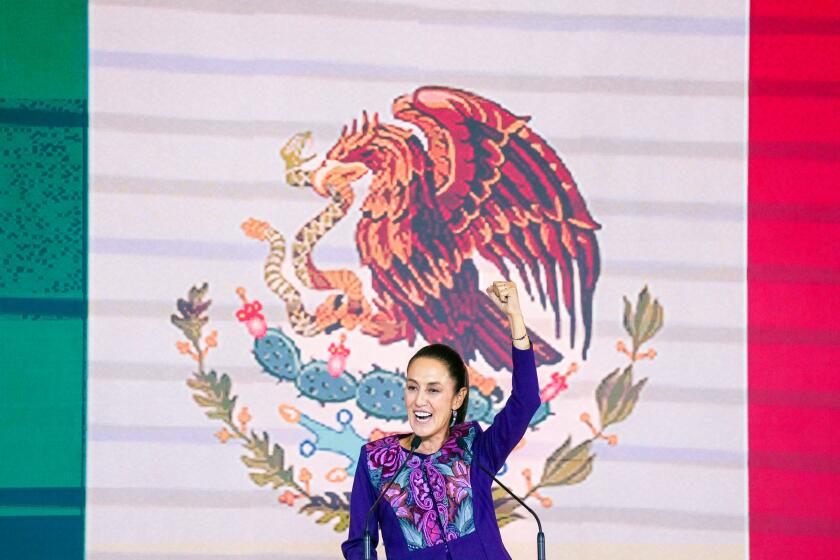Shattering glass ceiling, Claudia Sheinbaum takes office as Mexico’s first female president

- Claudia Sheinbaum breaks the political glass ceiling in a nation where women did not win the right to vote until 1953.
- “I am not alone,” she said of women. “We all arrived.”
- Sheinbaum takes power at a turbulent time in Mexico, where she’ll face issues of violence and migration as well as the enormous expectations left by her popular predecessor, Andrés Manuel López Obrador.
MEXICO CITY — Claudia Sheinbaum, a climate scientist who jumped from academia to the rocky world of politics, took office Tuesday as Mexico’s first female president.
Her inauguration shatters a political glass ceiling in a nation with a long legacy of machismo, where women did not win the right to vote until 1953.
“For a long time, women were sidelined,” Sheinbaum said after taking the oath of office at a ceremony in Mexico City. “As children, we were told a version of history where the protagonists were men.... Now we know that presidents can be women.”
The crowd erupted in chants of: “Presidenta!”

Sheinbaum, 62, takes power at a turbulent time globally and in Mexico, where she’ll face the perennial issues of violence and migration as well as the enormous expectations left by her highly popular predecessor, Andrés Manuel López Obrador.
She donned the presidential sash — embroidered with the Mexican tricolor and embossed with the gold-threaded national coat of arms — at San Lázaro palace, the seat of the Mexican Congress.
The ceremony was delayed as both Sheinbaum’s car and the one carrying López Obrador to Congress were thronged by well-wishers lining the roadways. News crews on motorcycles tailed both cars between buildings festooned with banners showing Sheinbaum’s image.

Scattered groups of demonstrators gathered to protest López Obrador’s controversial overhaul of the judiciary, which Sheinbaum has backed. But the groups were far outnumbered by celebrants.
“I arrived here very early because I wanted to feel the emotion of a woman receiving the presidential sash, something I never thought I would live to see,” said Karina Gutiérrez, 42, an accountant. “I’m really emotional. I want to cry. Finally, we have a woman president in a nation always dominated by men. It’s a historic day.”
Sheinbaum’s ascension to Mexico’s highest office comes as women have made considerable gains across the political system here, thanks in part to a law that requires political parties to ensure that female candidates make up at least 50% of all competitors in federal, state and municipal elections.
Today, more than half of the members of Congress and nearly a third of governors are women, along with the heads of the Supreme Court and the central bank.
Speaking at her inauguration, Sheinbaum described her win as a victory for all women, “for those who fought for their dreams and achieved it, and to those who did not achieve it, to those who had to keep quiet and shout alone, to the Indigenous women, the domestic workers who leave their villages to support us, to the great-grandmothers who did not learn to read and write because that was not a thing for girls, to the mothers who first gave us life and then everything else, the sisters, the aunts, the beautiful daughters.”
“I am not alone,” she said. “We all arrived.”
Sheinbaum, a leftist who has vowed to take a pragmatic approach to Mexico’s problems and prioritize the country’s working class, won in a landslide in national balloting on June 2. She will be Mexico’s 66th president since its independence from Spain in 1821 and serve a single six-year term, as mandated under Mexican law.
The granddaughter of immigrants from Eastern Europe, Sheinbaum will also be the first person of Jewish ancestry to serve as president in an overwhelmingly Roman Catholic nation.
For years, women have made inroads into Mexican politics thanks to a 2019 constitutional reform requiring gender parity in all elected posts.
She is a close ally of López Obrador, who plucked her from academia to be his environmental secretary in 2000 when he was mayor of Mexico City.
Sheinbaum went on to be elected mayor of the capital borough of Tlalpan, and then in 2018 — the same year that López Obrador assumed the presidency — she became mayor of Mexico City.
Tuesday’s ceremonial transfer of power was attended by heads of state from across the globe, including the leftist leaders of Brazil, Colombia, Chile and Guatemala. First Lady Jill Biden attended, as did California Gov. Gavin Newsom.

Sheinbaum ran under the banner of the ruling National Regeneration Movement, known as Morena, a party registered by López Obrador just a decade ago that has quickly become the country’s dominant political force.
Sunday’s election for governor of the state of Mexico could spell the end of the long-dominant Institutional Revolutionary Party and further cement the dominancy of President Andrés Manuel López Obrador’s Morena party.
The party holds a de facto supermajority in the Mexican Congress and governorships in 24 of 32 Mexican states.
Sheinbaum has vowed to continue the sweeping “transformation” of Mexican society pledged by her predecessor, who vastly expanded welfare payments for students and the elderly, increased the power of the military and championed a series of controversial constitutional reforms. Among them is an incendiary plan to elect federal judges that has sparked national protests.
Among the challenges the new president will face, perhaps none is greater than the rising power of organized crime, which controls vast swaths of the country and has expanded from cross-border drug trafficking to extortion, kidnapping and other rackets.
An escalating turf war engulfing much of Mexico’s heavily Indigenous Chiapas state has displaced thousands as gangs battle for drug- and gun-trafficking routes.
Some observers worry that López Obrador’s big spending on social programs and giant infrastructure projects such as a 1,000-mile train through the Yucatan jungle could leave her administration in difficult economic straits. But Mexico benefits from its proximity to the United States and the presence of manufacturers geared to export to its northern neighbor.
Sheinbaum will also have to deal with the continued challenge of illicit immigration as Mexico has become a major transit point for U.S.-bound migrants from across the globe.
More migrants illegally enter the United States along this California stretch of the border than anywhere else. They’re not coming from the places you’d expect
Though often critical of U.S. policy, López Obrador cooperated closely with Washington and both the Biden and Trump administrations in their efforts to clamp down on illegal migration, deploying police and soldiers to turn migrants back from the U.S.-Mexico border. Sheinbaum is widely expected to continue that cooperation in a U.S. election year in which immigration has become a dominant campaign issue.

Looming over her presidency is López Obrador, 70, who has vowed to retreat to his family ranch in southern Chiapas state and stay out of the political fray that has consumed his adult life. He leaves office with approval ratings topping 70% — much of it from poor and working-class Mexicans who have seen increases in the minimum wage, pensions and social welfare payouts under his leadership. But the country is deeply divided about his often-polarizing pronouncements and style.
Despite spiraling violence and a stagnating economy, Mexican President Andrés Manuel López Obrador has maintained sky-high approval ratings because he speaks to the working poor.
Sheinbaum is widely regarded as a pragmatist who lacks some of the political instincts of her populist predecessor. She says her scientific background will benefit her handling of issues such as energy, which has been a source of contention here. López Obrador has focused on reviving the moribund state petroleum behemoth Pemex, while investing little in alternative energy sources.
“I have always said that being a scientist implies always asking why and seeking solutions,” Sheinbaum said last year in an interview with the Los Angeles Times. “And in politics, something similar happens.”

One of three siblings, Sheinbaum is a native of Mexico City. Her late father was a businessman and chemical engineer, and her mother is a biologist and prominent academic.
Her parents were active in the student movement of 1968, best known for the infamous Tlatelolco massacre in which Mexican security forces killed scores of protesters in the capital.
As a high schooler, Sheinbaum participated in protests against the exclusion of students, many of them poor, from higher education. While studying at the Autonomous University of Mexico, or UNAM, she was part of a movement against a plan to raise fees at the public institution.
She studied physics there and later did four years of doctoral work at the Lawrence Berkeley National Laboratory in California.

Last year, Sheinbaum married Jesús María Tarriba, a physicist who works in the private banking sector. She has a daughter and stepson from a previous marriage.
At her inauguration, Sheinbaum said one of her first acts as president would be traveling Wednesday to Acapulco to survey the damage from Hurricane John, which killed at least 17 people and devastated multiple towns along Mexico’s Pacific coast.
In the afternoon, she addressed thousands gathered in Mexico City’s Zócalo, or central plaza, detailing 100 policy points — including plans on the economy, security and infrastructure projects.
Indigenous representatives presented her with a ceremonial, ribbon-festooned bastón de mando — a staff symbolizing political and spiritual leadership. As the new president spoke, Indigenous women stood behind her, holding cornstalks. Smoke from burning incense, used for purification in some Indigenous rituals, drifted above the lectern.
Sheinbaum vowed to steer Mexico along “the path of peace, security, democracy, protection of the environment, liberty and justice.”
Special correspondent Cecilia Sánchez Vidal contributed to this report.
More to Read
Sign up for Essential California
The most important California stories and recommendations in your inbox every morning.
You may occasionally receive promotional content from the Los Angeles Times.
















